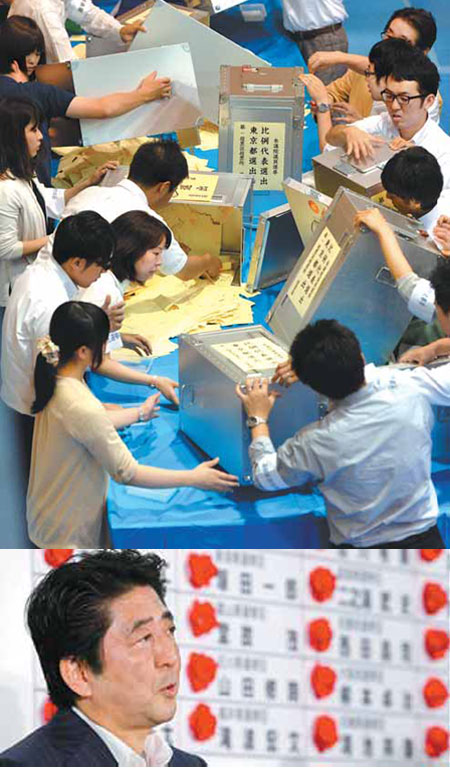Victory improves Abe's hand
|
Above: As ballot counting continues in Tokyo on Sunday, Japanese Prime Minister Shinzo Abe's Liberal Democratic Party and its allies have secured a landslide win in the upper house election. Below: Abe speaks in front of red rosettes on the names of the Liberal Democratic Party's winning candidates at the party's headquarters in Tokyo. Photos by Yoshikazu Tsuno / Agence France-Presse AND Shizuo Kambayashi / Associated Press |
Japanese leader given more say to continue right-wing approach
Japanese Prime Minister Shinzo Abe's ruling coalition sealed a decisive victory in Sunday's upper house election, a win analysts said may embolden Abe's right-wing political claims and further complicate ties with neighbors.
The victory allows the ruling camp to take control of all standing committees, facilitating the passage of bills, as it already holds an overwhelming majority in the more powerful lower house.
This was the first national vote since Abe took office in December. By press time, the Liberal Democratic Party and partner New Komeito had won more than 70 of the 121 seats at stake, half of the entire 242 seats in the upper house.
With the coalition's uncontested 59 seats, it will have a majority in the upper house.
The win for the Liberal Democrats also ended a "twisted Diet", where the opposition-controlled upper house sought to block legislation and hamper policies since Abe's humiliating defeat in the 2007 election.
"The Abe administration can become a long-term regime," said Koji Nakakita, a professor of politics at Hitotsubashi University in Tokyo. "It even has the potential to go beyond the next three years."
Experts said that stable control of the two houses for the first time in six years may help Abe push through his long-standing wish for constitutional reforms, a prospect that will upset neighboring countries.
The Liberal Democratic Party has called for changing Article 96 of Japan's constitution to lower the threshold for amendment to a simple majority of all members of each chamber of the Diet, instead of the two-thirds required at present.
Huo Jiangang, an expert on Japanese studies at the China Institutes of Contemporary International Relations, said it remains difficult for the party to make the move, although the Abe administration's control over Japanese society has now reached a new height, as seen from the election result.
"Its coalition partner New Komeito openly objects to revising the constitution, and it takes a two-third majority from both houses as well as a national referendum to push through this clause," Huo said. "Also, the public is not very interested in such matters."
Abe found popularity in Japan amid a stagnant economy by practicing "Abenomics", which has lifted the stock market, boosted business confidence and helped exporters by weakening the yen since he took office after the Liberal Democrats won a lower house election in December.
"We are at the threshold of economic recovery. There is no mistake about the policies that we are carrying out," Abe was quoted by AFP as saying.
Wu Huaizhong, a researcher of Japanese Studies at the Chinese Academy of Social Sciences, said Abe needs to realign the nation's economic and political relationship with China.
"Abe will have to pull close to China on economic cooperation, but on territorial issues, he will probably not concede," Wu said.
Ties between Beijing and Tokyo have been strained since Tokyo illegally "nationalized" part of China's Diaoyu Islands in the East China Sea in September.
Days before the election, Abe visited Ishigaki and Miyako islands, Japan's southwestern fringes, to rattle sabers and pledge to "not give an inch" in a bitter standoff with China.
Abe also irritated China and South Korea by saying he hoped to revise a 1995 apology by Japan for its wartime aggression and questioning the extent to which Korean, Chinese and other Asian women were coerced to provide sex for Japanese soldiers before and during World War II.
Many Japanese have asked the Abe administration to change its approach toward neighbors.
Paying close attention to the election, Japanese film director Hayao Miyazaki said that conflicts over the islands should be shelved and Japan should make friends with China. Miyazaki also criticized the Japanese government for taking the opportunity to amend the constitution at will, calling it "simply outrageous".
Voter turnout was reported to be lower this election than last time.
Many voters expressed concerns over Japan's foreign policy and the dominance of Abe's party.
Tanaka, a Tokyo worker in his 20s who voted for the Liberal Democratic Party, was worried about Japan's ties with neighbors.
"Japan should have dialogue with China and South Korea. If it doesn't work, a third party with a neutral stand can be invited to help find a solution," he said.
Aiko Kato, an 80-year-old retiree in Tokyo, said she was hesitant about her decision because the Liberal Democratic Party's dominance in both houses would lead to many problems, saying she chose the ruling party for a better society where her grandchildren will grow up.
AFP and Reuters contributed to the story.



















